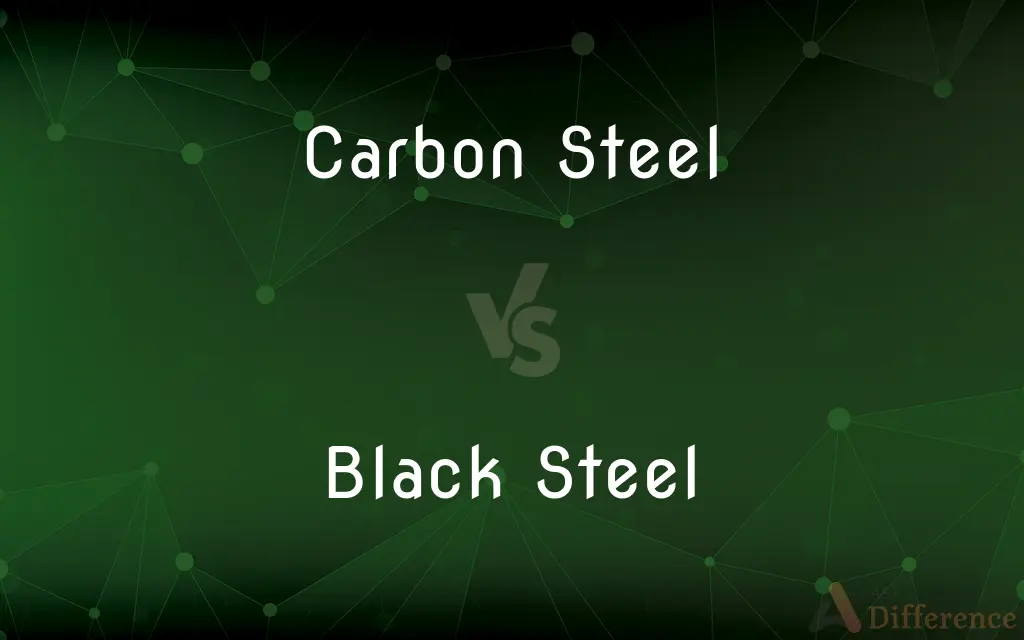Carbon Steel vs. Black Steel — What's the Difference?
Edited by Tayyaba Rehman — By Fiza Rafique — Published on November 2, 2023
Carbon Steel is steel with carbon content up to 2.1%, determining its hardness. Black Steel, often a type of Carbon Steel, is coated in black oxide for anti-corrosion properties.

Difference Between Carbon Steel and Black Steel
Table of Contents
ADVERTISEMENT
Key Differences
Carbon Steel and Black Steel have distinctions primarily in their composition and applications. Carbon Steel, as the name suggests, is an alloy of iron and carbon, with carbon content up to 2.1% by weight. The carbon percentage determines its hardness and strength. In contrast, Black Steel refers to Carbon Steel that has undergone a specific process to give it a black oxide finish.
Carbon Steel is categorized based on its carbon content: low, medium, and high. This content impacts its ductility, strength, and welding properties. While Carbon Steel can naturally corrode and rust when exposed to moisture, Black Steel has a black oxide layer on its surface which provides certain anti-corrosion properties.
Black Steel is often used in piping due to its resistance to corrosion. This black oxide finish is achieved during the hot-rolling process. Although Black Steel is a type of Carbon Steel, not all Carbon Steels undergo this blackening process, thus not all are termed as Black Steel.
Carbon Steel, in its various forms, is used in knife blades, machinery parts, and even in structural components. Black Steel, due to its finish, finds extensive use in gas lines and other pipes. The black oxide finish not only imparts corrosion resistance but also ensures the steel doesn't reflect light, making it desirable for certain applications.
To wrap up, while both Carbon Steel and Black Steel can be similar in composition, their distinct characteristics arise from carbon content and specific processing, especially the black oxide finish in the latter.
ADVERTISEMENT
Comparison Chart
Composition
Steel with up to 2.1% carbon content.
Often a Carbon Steel with a black oxide finish.
Corrosion Resistance
Can corrode if not protected.
Black oxide finish offers some anti-corrosion.
Appearance
Can vary based on processing.
Characteristically black due to oxide finish.
Usage
Machinery, structural components, blades.
Primarily in piping and gas lines.
Reflectivity
Varies.
Non-reflective due to the black finish.
Compare with Definitions
Carbon Steel
A metal often used for its strength and durability.
Many structural beams are made of Carbon Steel for support.
Black Steel
Carbon Steel with a black oxide finish.
Black Steel pipes were used for the gas line installation.
Carbon Steel
An iron alloy with up to 2.1% carbon.
The chef preferred knives made of Carbon Steel for their sharpness.
Black Steel
Carbon Steel processed for a non-reflective finish.
Black Steel is often chosen for applications where light reflection is undesirable.
Carbon Steel
Steel classified by its carbon content level.
Carbon Steel with higher carbon content tends to be harder but less ductile.
Black Steel
A type of steel with anti-corrosion properties.
For outdoor settings, Black Steel fixtures are preferred.
Carbon Steel
A prevalent metal in industrial applications.
Carbon Steel fasteners are widely used due to their strength.
Black Steel
Steel known for its characteristic black appearance.
The Black Steel frame added a modern touch to the furniture.
Carbon Steel
Alloy known for its variable properties based on carbon percentage.
The machine parts made of Carbon Steel lasted longer than expected.
Black Steel
Steel commonly used in piping due to its finish.
The plumbing utilized Black Steel due to its durability and finish.
Common Curiosities
Can Carbon Steel resist corrosion?
On its own, Carbon Steel can corrode; protective coatings or treatments are needed.
Why is Black Steel black?
Black Steel has a black oxide finish giving it its characteristic appearance.
What defines the hardness of Carbon Steel?
The carbon content determines the hardness of Carbon Steel.
Is Black Steel always a type of Carbon Steel?
Often, but not always. It typically refers to Carbon Steel with a specific black finish.
Which is more expensive, Carbon Steel or Black Steel?
Prices can vary based on quality, but Black Steel might have added costs due to its finish.
Is Black Steel's black finish natural?
No, it's a result of a specific processing giving it the black oxide finish.
Can Carbon Steel be made into Black Steel?
Yes, by undergoing the blackening process, Carbon Steel can become Black Steel.
Can Black Steel be used in cookware?
Yes, some cookware, especially pans, are made from Black Steel.
Does Carbon Steel's strength vary?
Yes, based on its carbon content, Carbon Steel's strength can vary.
Are all Carbon Steel products hard?
Not all; hardness varies with carbon content. Low carbon steels are softer.
Why choose Black Steel for piping?
Black Steel's finish offers some anti-corrosion properties suitable for piping.
How do I maintain Black Steel surfaces?
Regular cleaning without abrasive materials can help maintain its finish.
Share Your Discovery

Previous Comparison
Goods vs. Products
Next Comparison
Miami vs. Miami BeachAuthor Spotlight
Written by
Fiza RafiqueFiza Rafique is a skilled content writer at AskDifference.com, where she meticulously refines and enhances written pieces. Drawing from her vast editorial expertise, Fiza ensures clarity, accuracy, and precision in every article. Passionate about language, she continually seeks to elevate the quality of content for readers worldwide.
Edited by
Tayyaba RehmanTayyaba Rehman is a distinguished writer, currently serving as a primary contributor to askdifference.com. As a researcher in semantics and etymology, Tayyaba's passion for the complexity of languages and their distinctions has found a perfect home on the platform. Tayyaba delves into the intricacies of language, distinguishing between commonly confused words and phrases, thereby providing clarity for readers worldwide.













































